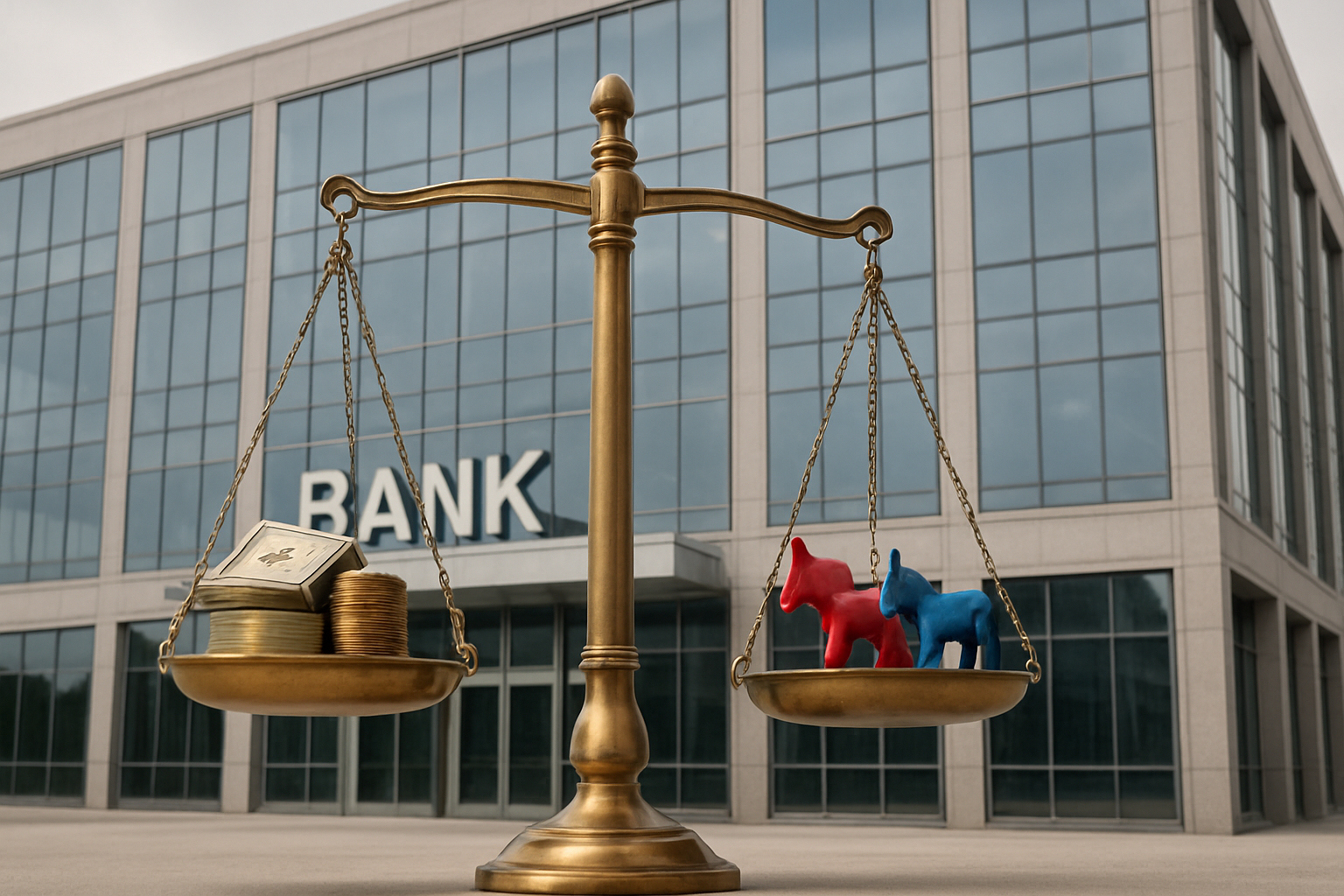The old joke in banking used to be that lenders offer you an umbrella when it's sunny and ask for it back when it starts to rain. These days, the weather forecast in financial services seems increasingly political.
Word is circulating that the White House plans to issue an executive order targeting banks that allegedly discriminate against conservative or religious groups. It's a move that has financial institutions nervously reviewing their policies while simultaneously insisting they've never engaged in such practices. (Of course they would say that, wouldn't they?)
I've been tracking the growing tension between banking and politics for years, and this development represents a significant escalation. Conservative groups have long claimed they've been shut out of financial services because of their beliefs. Meanwhile, cryptocurrency companies—which tend to attract a libertarian-leaning crowd—say they've been effectively blacklisted under the current regulatory regime.
Let's be real about what's happening here.
Banking is, at its core, a risk management business. Lenders evaluate potential customers based on credit risk, compliance risk, reputational risk, and regulatory risk. The fundamental question is whether "political risk" has inappropriately become part of that calculation.
Banking's Impossible Balancing Act
Having spent time with executives at several major financial institutions, I can tell you most bankers would rather count money than count votes. The profit motive typically trumps ideology—banks want customers who pay their bills and don't create headaches, full stop.
But there's an inherent tension that's becoming impossible to ignore. Banks today are simultaneously expected to be:
- Politically neutral service providers
- Careful stewards preventing systemic risk
- De facto enforcers of anti-money laundering rules
- Guardians of their own reputations
These objectives crash into each other constantly. Take cryptocurrency companies—are they innovative financial pioneers or regulatory nightmares waiting to happen? Your answer probably depends on which side of the political aisle you're sitting on.
The Pendulum Swings (Again)
What we're witnessing is as predictable as it is ironic. Under Democratic administrations, banks face pressure to consider environmental and social factors in their lending decisions. When Republicans take power, suddenly banks face scrutiny for allegedly discriminating against industries like fossil fuels, firearms, or faith-based organizations.
The hypocrisy is... substantial. Conservatives who typically champion businesses' right to choose their customers are now essentially arguing for protected class status. Meanwhile, progressives who built careers advocating for anti-discrimination protections have discovered a newfound passion for banks' freedom of association.
Bank of America's carefully worded statement that they "welcome the administration's efforts to provide regulatory clarity" is corporate-speak at its finest. Translation: "Please just tell us exactly what you want so we can stop being political punching bags and get back to making money."
Crypto's Complicated Case
The cryptocurrency angle deserves a closer look. The draft order apparently connects banks' reluctance to serve crypto companies with political bias—but that's stretching things.
Look, banks' hesitancy around crypto has more to do with legitimate business concerns—regulatory uncertainty, compliance headaches, and the small matter of several industry-shaking collapses and fraud cases (remember FTX?)—than with detecting libertarian leanings in blockchain enthusiasts.
I spoke with several mid-level compliance officers at regional banks last year who all said variations of the same thing: they'd love the crypto business if they could figure out how to manage the risks. It wasn't politics; it was pragmatism.
Two Visions of Banking
At its heart, this conflict represents two fundamentally different visions of what banks should be:
The "Neutral Utility" model: Banks should serve everyone equally without making value judgments beyond standard risk assessment.
The "Values-Based" model: Banks should consider broader societal impacts and values alignment when choosing customers and investments.
Both approaches have merit... and problems. The neutral utility model promotes equal access but might ignore legitimate externalities. The values-based approach acknowledges banks' social impact but opens the door to arbitrary discrimination.
The current administration seems to be pushing hard toward the neutral utility model—at least when it comes to conservative clients. Whether this same principle would extend to all political viewpoints? Well, I have my doubts.
For banks, this is just another day navigating the regulatory obstacle course. They must somehow satisfy progressive stakeholders demanding they consider social impacts while simultaneously pleasing conservative stakeholders demanding they ignore political considerations.
No wonder they're begging for "regulatory clarity." In this environment, the safest strategy is keeping your head down, your compliance department well-staffed, and your political donations carefully balanced between both parties.
What happens next? Banks will adapt as they always do—finding the path of least resistance through the regulatory landscape while protecting their bottom lines. The question that matters is whether Americans of all political stripes will ultimately gain better access to financial services, or simply witness another skirmish in our exhausting culture wars.
Banking, it turns out, is just politics with higher interest rates.
